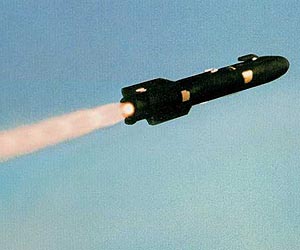 The review informed budget decisions, Mr. Miller said, and President Barack Obama asked for a $700 million increase in ballistic missile defense funding in fiscal 2011 over 2010. |
Washington DC (SPX) Apr 22, 2010Ballistic missiles are an increasing threat to the United States and the Defense Department must keep up with them, the deputy undersecretary of defense for policy said. James N. Miller, speaking about the department's Nuclear Posture Review April 20 before the Senate Armed Services Committee, said several nations are developing nuclear, chemical or biological warheads for their missiles.
The threat to the U.S. homeland is most acute from states such as North Korea and Iran, Mr. Miller said.
"Neither has yet acquired ICBMs that could reach the United States, but both are working to acquire and/or develop long-range ballistic missile capabilities, including space-launched vehicles, which include many of the necessary technologies," he said.
Short- and medium-range missiles have proliferated rapidly over the past decade. Iran and North Korea are the primary troublemakers, Mr. Miller said, and represent significant regional missile threats.
Mr. Miller listed six policy priorities for U.S. missile defense. The first is to continue to defend the homeland against the threat of limited ballistic missile attack.
"The top priority for U.S. missile defense efforts is to defend the United States from the threat of missile attack by regional actors such as North Korea or Iran," he said. "The United States does not intend for missile defense to affect the strategic balance with Russia or China."
The second priority is to defend against regional missile threats to U.S. forces while protecting allies and partners and helping to enable them to protect themselves. One part is a new phased adaptive approach for missile defense in Europe. The United States has concluded agreements with Romania and Poland to host the two planned land-based sites for interceptors in 2015 and 2018, respectively.
"The Ballistic Missile Defense Review concluded that the United States should pursue a phased adaptive approach not only in Europe, but also in other regions, particularly Northeast Asia and the Middle East," Mr. Miller said. "And this approach will be tailored to the threats appropriate to those regions."
The third priority, Mr. Miller said, is realistic and tough testing before fielding any new technologies.
A fourth is that new capabilities must be fiscally sustainable over the long term.
"Our investments in (ballistic missile defense), as in other areas, must be managed to ensure that there are sound capability improvements at reasonable cost and in overall balance with other defense priorities," he said.
Ballistic missile defense also must be flexible to evolve as the threat evolves, Mr. Miller said.
Finally, he continued, the United States will lead expanded international efforts for missile defense.
"We are working with allies and partners to strengthen deterrence and build regional security architectures, through improved missile defense and through other measures," he said.
The review informed budget decisions, Mr. Miller said, and President Barack Obama asked for a $700 million increase in ballistic missile defense funding in fiscal 2011 over 2010.
By : Staff Writers (Spacedaily.com)



No comments:
Post a Comment